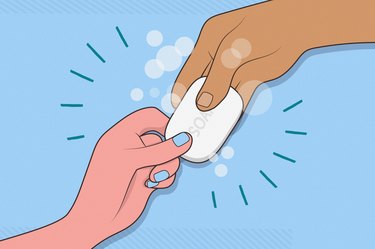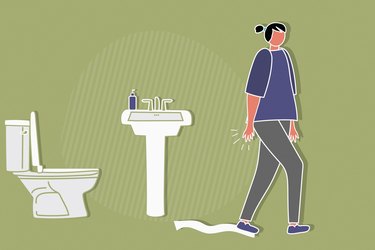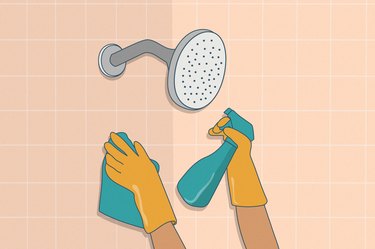
You're staying with a friend and whoops, you forgot to bring a bar of soap for the shower. Or, maybe you and your partner share the Dove daily. Ever stopped to think if you're swapping more than just suds?
If this sounds like you, you can breathe a sigh of relief. It's really not so bad, Kelly Reynolds, PhD, professor in public health and environmental science at The University of Arizona, tells LIVESTRONG.com. That said, don't think you can make a clean getaway just yet: Details matter here, so there are things you need to know before grabbing someone else's soap.
Video of the Day
Video of the Day
The Science Behind Soap Sharing
"Believe it or not, there have been quite a few peer-reviewed, published studies on this exact topic," Reynolds says.
Though it sounds logical, soap itself isn't necessarily self-cleaning. And some research has found that bacteria stick around after washing up with soap. For instance, one April-June 2006 study in the Indian Journal of Dental Research found that bar soap harbored two to five different types of germs.
More recently, a July 2015 study in the American Journal of Infection Control was done in a hospital setting and found that about 62 percent of bar soaps were contaminated, while just 3 percent of liquid soaps were.
The bummer about this? Well, bacteria lurking on soap could potentially spread from person-to-person should you choose to share.
Some of the germs in question sitting on soap could include E. coli, salmonella and shigella bacteria, as well as viruses like norovirus and rotavirus and staph, Reynolds points out. Some can spread by getting into wounds or scratches on the skin, while others are spread from feces (ahem, you are washing your butt, right?).
That's why you're certainly not going to see bar soap in a public restroom for hand washing (ew, can you imagine?). Instead, liquid soap dispensers with a changeable soap bag are the safest option, Reynolds says. "We never find bacteria in these," she adds.
But when you're at home, it's a different story. Presumably you may be sharing soap with people you know — not strangers. And ultimately, it all comes down to human behavior, Reynolds says — the habit could be bad without taking some precautions first.
If you do need (or want!) to share, the habits below will reduce the risk of spreading anything nasty to you or your soap-sharing partner or friend. This applies whether it's a regular or antibacterial soap, or you're scrubbing up with cold or hot water.
1. Clean Off
Just got done scrubbing up? Rinse off the bar of soap. (Simply put: You're cleaning your soap here.) Similarly, to be safe, rinse the bar off before using it on your body or face.
2. Lather Up
Getting sudsy is healthy. "Bacteria like to stick to soap bubbles," Reynolds says. Grime will then be washed down the drain. She suggests a 20- to 30-second lather time.
3. Air It Out
Bacteria thrive in damp environments. So, a wet bar of soap will provide an opportunity for germs to grow. Make sure the bar is able to air out, preferably with a draining soap dish. "As soap dries out, bacteria counts go down, which lowers the risk of transferring any bacteria," Reynolds says.
Alternatives to Sharing Soap
Not liking the ick factor? Uncomfortable not knowing exactly how the other person has used the soap? Have kids in the house who, let's be real, are still refining their hygiene practices?
If you do have a choice, then go for a disposable liquid hand soap or liquid body wash, Reynolds recommends.
Sometimes, you might have an emergency — like you're traveling together and have one bar accessible at the moment — in which case, you might decide that sharing is worth it to be able to wash up. That's OK, just stick to the guidelines above.
If it's your hands you're washing, then remember that hand-washing is one of the best defenses when it comes to transmission of disease, according to the Centers for Disease Control and Prevention (CDC). "The most important thing here is washing your hands. Don't worry too much about the soap," Reynolds says. Wash up well: Lather for 20 seconds and scrub all parts of your hands, then rinse and dry, per the CDC.
It's not bad, as long as you take a few precautions to reduce the risk of spreading germs, including rinsing off the soap before and after use, lathering up for 20 to 30 seconds and allowing the bar to dry in between uses.
- Indian Journal of Dental Research: “Microbial contamination of “in use” bar soap in dental clinics.”
- American Journal of Infection Control: “Increase in hospital purchase of hand hygiene products: The importance of focusing on the right product.”
- Centers for Disease Control and Prevention: “Show Me the Science – Why Wash Your Hands?”
- Centers for Disease Control and Prevention: “When and How to Wash Your Hands”
Was this article helpful?
150 Characters Max
0/150
Thank you for sharing!
Thank you for your feedback!
Is this an emergency? If you are experiencing serious medical symptoms, please see the National Library of Medicine’s list of signs you need emergency medical attention or call 911.



